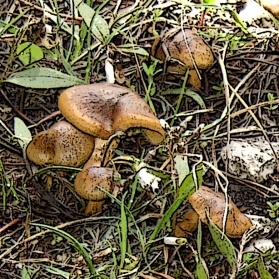Out of the depths I cry to you, O God.
God, hear my voice! (Psalm 130:1-2)
Jesus wept. (John 11:35)
In the wake of the shootings in Connecticut last week, it’s time to ask that immemorial question: If God is all-good and all-powerful, why do things like this happen?
This question actually boasts its own academic discipline – theodicy. It’s a very dicey subject, because, in my humble opinion, there’s only one way to answer the question that doesn’t make both God and God’s biggest fans look like assholes. Unfortunately, many of God’s biggest fans would rather look like assholes than entertain this response to the question:
Things like this happen because God is not all-powerful.
There are two other possible answers: a) that God is not all-good or, b) that God is neither all-good nor all-powerful.[i]
Infinitely better minds than mine have floated the notion that the Abrahamic God is, at best, morally ambiguous; we’re talking people like David Hume, Bertrand Russell, Reinhold Niebuhr, and Christopher Hitchens, here. I don’t claim to fathom all of their arguments, but their dubiousness about God’s goodness is legendary.
At this point in my life, however, I’m not prepared to give up on the goodness of God, even in the wake of a horror like Sandy Hook. Which leaves me with the question of God’s power.
If God is all-good and God is all-powerful, why do terrible things happen?
I think it boils down to free will, but not in the way people like Mike Huckabee and Rick Warren would have us believe.
Free will is a big sticking point in my Protestant tradition. It gets all mixed up with theological crap like predestination and original sin.[ii] For purposes of today’s posting, I’d like to suggest that God didn’t create us to be wind-up toys.[iii] God created us for relationship. If nothing else, the Hebrew and Christian testaments describe a uniquely interpersonal affiliation between human beings and the divine, liberally described in familial and matrimonial terms.[iv] The sacred texts also describe the rewards and pitfalls of human free will.
In a situation of infinite power disparity, benign tyranny is the best we can hope for; but I think God wants something better than that. For relationship to be rich and reciprocal, both sides must freely choose to relate with one another. Which means that, in order to genuinely relate with human beings, God has to power down several degrees. And I think God does that by declaring certain aspects of human experience hands-off.
When things happen like Sandy Hook, Virginia Tech, or Columbine or the Aurora movie theater shootings (the latter of which both happened in my home town), I think we’re seeing God’s rules of divine non-engagement kicking in. These incidents have nothing to do with “God’s larger plan.” Honestly, what kind of God would craft a plan in which five-year-olds are collateral damage?[v] Certainly not a good God, which brings me back to my argument that God is all-good, but not all-powerful. Having created us in the divine image, God gives us room to fly…and room to fuck up.[vi]
What this seems to boil down to is this: that the payoff for lives of suffering, confusion, violence and chaos is the opportunity to relate deeply and authentically with God.[vii] Even to me, this seems like cold comfort when there’s a lake of warm blood on the floor of a schoolroom. But if an all-powerful God elects to limit his/her power in the interest of an eternal love affair with human beings, let us consider that compassion may be an altogether limitless characteristic of the divine.

To my way of thinking, omnipotence cannot coexist with infinite compassion. Because if God is all-compassionate, then God is vulnerable. In the wake of a semi-automatic slaughter like Sandy Hook, I don’t see God crossing his burly arms, throwing up his white-bearded chin, and waiting for America to repent of its godless refusal to turn public schools into Christian churches. I do see a tender and grieving God in the faces of the tear-streaked bereaved, in the shocked and weary faces of the first responders, in the care-worn faces of pastors and chaplains. I do see a helping and determined God in the efforts of everyone who forgoes their own comfort to help others navigate the seemingly bottomless pits of mortal life. I see God in wordless candlelight vigils, I see God weeping on fresh dug graves, and I see God when strangers embrace each other, offering themselves as momentary life preservers in a dark and savage sea.
And yes, in times like these, I see God in a carpenter’s son in a society that drooled over weapons and denigrated weakness, suffocating to death on a cross and still managing to gasp,
“Forgive them, for they have no idea what they’re doing.”[viii]
[i] If the latter, I’m hard-pressed to understand why I should have anything to do with God.
[ii] And, in the U.S., a lot of political crap like prayer in schools and the Ten Commandments on public buildings.
[iii] Frankly, I’m not sure God created us at all, if by creation you mean that God pulled us full-formed out of his ass. Rest assured, the turd analogy is one I plan to explore more earnestly in systematic theology class next year.
[iv] As described in the Bible, the relationship has frequently been unhappy, unstable, even abusive; both sides, at intervals, have behaved monstrously. But the attraction has been undeniable and irresistible. And, for some Christians, the physical incarnation and body/spirit sacrifice of Jesus Christ[iv] paved the way for ongoing reconciliation between ourselves and God.
[v] I’ll take the devil over that kind of deity any day. This kind of deity looks more like a Third World dictator. I don’t think we should settle for an image of God that shines up no better than Kim Jong-Il’s.
[vi] Let me quickly note here that I also don’t believe that God “allows” us to suffer in order to “build our character.” That explanation does nothing but recast God as an untouchable, abusive parent who would rather inflict pain than share it.
[vii] And, by extension, each other. I think this is amply evidenced by the way people around the world naturally cohere after public tragedies.
© Marian the Seminarian, 2012

